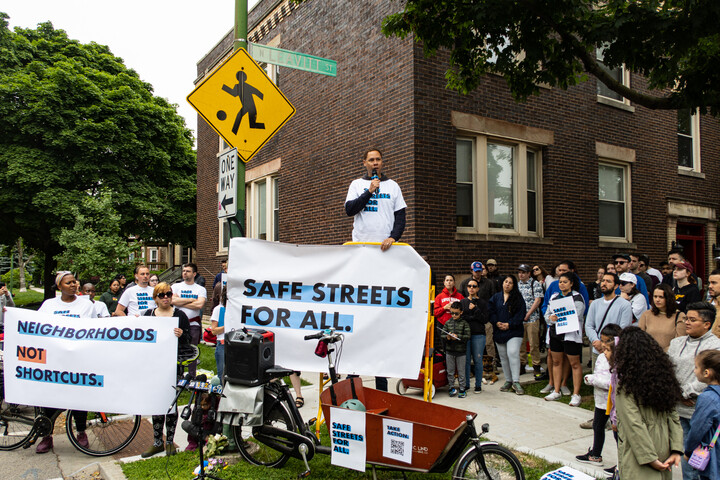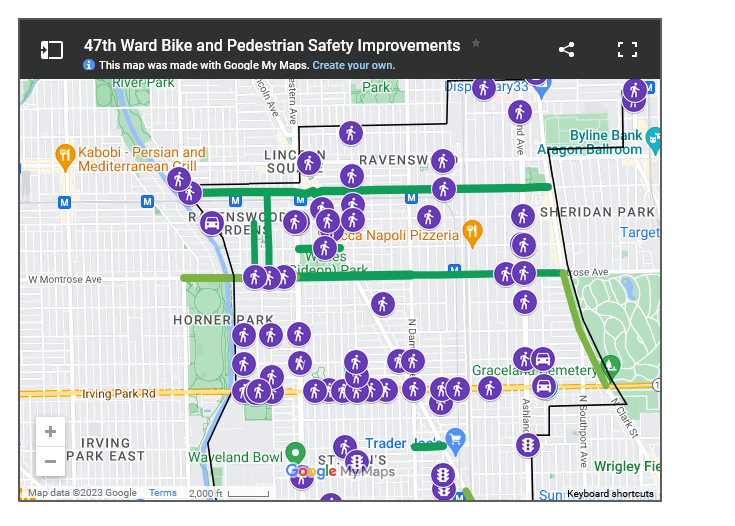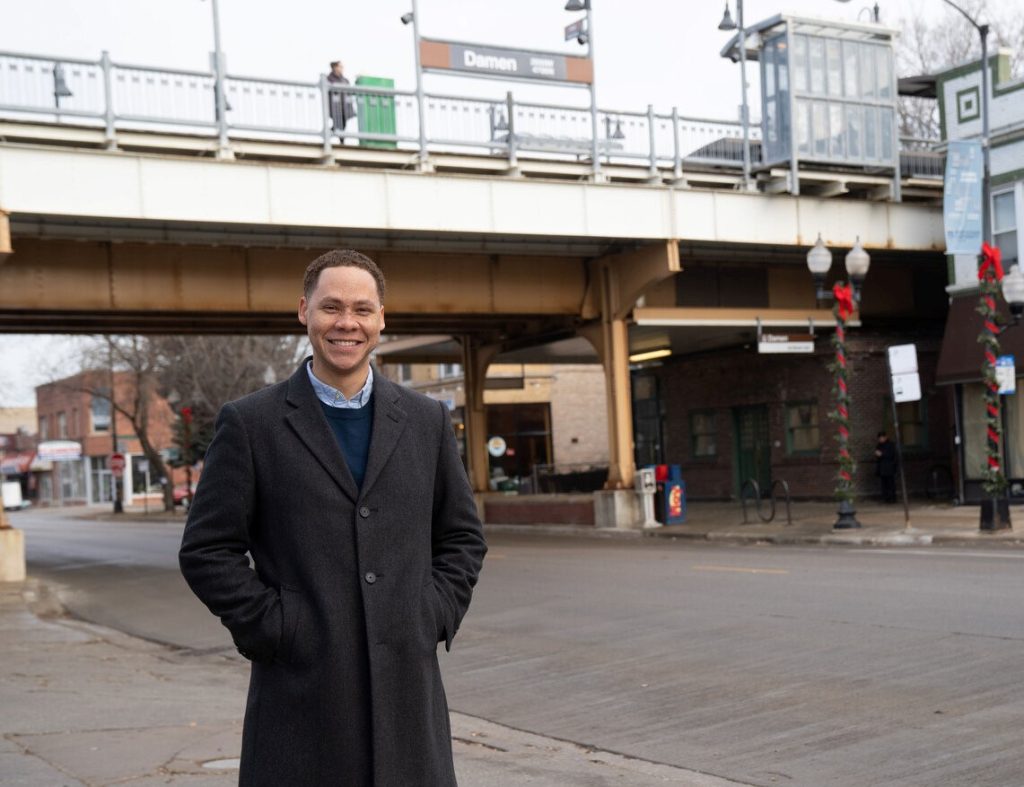The 47th Ward in Chicago has made significant progress in advancing pedestrian and bicycling safety over the last few years, thanks to the proactive efforts of Alderman Matt Martin.
And Martin says more is on the way as he continues to champion walking- and cycling-friendly infrastructure and policies that will benefit the constituents of his ward and beyond.
His steadfast commitment to making walking and bicycling safer in Chicago has earned Martin Active Transportation Alliance’s Safe Streets Champion award, which he will receive at the nonprofit’s Movers and Shakers Ball on April 26.
Martin, who previously worked as a civil rights attorney for the Illinois Attorney General’s office, has made walking and bicycling safety one of his top priorities since he was elected in 2019 to represent the 47th Ward, which consists of parts of North Center, Lincoln Square, Ravenswood, Lakeview, Andersonville, and Uptown.
He has been a vocal advocate for sustainable transportation because the residents of these neighborhoods on the North Side of Chicago depend primarily on walking, bicycling, and public transit to commute to their jobs; visit their friends and families; and access essential services, such as health care and grocery stores.
“It’s critical to improve infrastructure for pedestrians, for bikers, for transit riders based on what we’ve heard from residents,” says Martin, who was recently re-elected after running unopposed. “We know for residents that it’s not just a personal preference. For some people, this is an absolutely critical way that they get from point A to point B, whether it is for work or for recreation. It just reflects how they get around our community. And I view community broadly, not just the 47th Ward, not just the North Side of Chicago, but all of Chicago.
“Some people can’t afford to have cars,” he continues. “Some might have mobility or ability issues, where driving a car is not an option for them. So to have alternative methods of transportation that are safe and reliable are absolutely critical.”
DATA AND ANECDOTES
To determine where to implement walking and bicycling infrastructure in the 47th Ward, Martin and his team study the ward’s collision data and talk to residents about their experiences walking and cycling in their neighborhoods.
One way he gets their feedback is by hosting Ward Nights at local businesses about specific topics, including transportation infrastructure. During these Ward Night presentations, Martin shares updates on progress and upcoming projects related to the topic and solicits residents’ input.
By combining collision data with resident feedback, Martin has been able to achieve major wins for pedestrians and cyclists in the 47th Ward. For example, in 2020, Martin successfully advocated to have Leland Avenue between Lincoln Avenue and Sheridan Road designated as a shared street, restricting vehicular traffic in favor of giving pedestrians more space to social distance during the COVID-19 pandemic.
In addition, the ward’s first concrete curb protected bike lane was installed in North Center in 2021 along a two-block stretch of Campbell Avenue that connects Roscoe Avenue with Belmont Avenue. Martin also implemented pedestrian and cycling infrastructure near neighborhood schools and senior centers. Those safety improvements included bike lanes, refuge islands, curb extensions, stop signs, and speed humps.

LOOKING TO THE FUTURE
As Martin embarks on his sophomore term, he has more sustainable transportation projects on his agenda. That includes building the 47th Ward’s second concrete curb-protected bike lane — this time on Clark Street between Irving Park Road and Montrose Avenue, a stretch of road popular with cyclists but plagued by speeding cars and other traffic safety issues. The new bike lanes will reduce risk of injuries and deaths to cyclists, according to Martin.
Martin is also looking forward to the construction of the Leland Avenue Neighborhood Greenway in Lincoln Square and Ravenswood in the summer or fall.
The long-awaited greenway will connect pedestrians and bicyclists safely to the North Shore Channel Trail, the Chicago Lakefront, and Lincoln Square. The project includes contraflow bike lanes, protected bike lanes, pedestrian islands, speed humps, high-visibility crosswalks, curb extensions, and a reduction in the speed limit to 20 mph from 30 mph.
In addition, Martin scored a huge victory earlier this year when he successfully pushed for pedestrian safety upgrades at six intersections on Irving Park Road.
The Chicago Department of Transportation will install infrastructure such as pedestrian islands, curb extensions, crosswalks and rectangular rapid flashing beacons. The RRFBs let pedestrians push a button to activate flashing lights that alert motorists when pedestrians are crossing a road. Irving Park Road will be one of the few streets in Chicago to have this traffic-control device.
Martin is particularly proud that the 47th Ward will have these safety measures in place along Irving Park Road by the end of the year. Martin had been advocating for safer walking infrastructure on Irving Park Road since 2020 given the high number of residents who walk in this area of North Center to get to the Brown Line train stations, parks, schools, and restaurants.
But residents told Martin that crossing this five-lane street on foot can be dangerous. That point hit close to home for Martin when his friend Peter Paquette was fatally struck by a distracted driver at the intersection of Irving Park Road and Hoyne Avenue last June.
“At the end of the day, you never want a tragedy to be something that’s the impetus for something getting done when it should have already been done,” Martin says. “But to keep Peter Paquette’s family updated about the improvements that are coming and knowing that can hopefully help prevent a tragedy like that from happening in the future is something that everyone should expect from government.”
Other upcoming projects include a large-scale renovation of the area surrounding the Western Brown Line Station. It will be revitalized with a bidirectional protected bike lane; a raised street; and a rebuilt plaza featuring planters filled with greenery and flowers, trees, lamp posts, fabric shades, and benches. The new plaza will host farmers markets and festivals in the summer. Martin also secured city funding for the Brown Line station itself to be remodeled, allowing the CTA to unlock matching federal funds for a total project cost of $30 million.

CITYWIDE MISSION
While Martin has delivered a plethora of sustainable transportation improvements to the 47th Ward, he wants to make sure the rest of the city has opportunities to implement walking and biking infrastructure. That’s why he advocated for sustainable transportation policies that will benefit pedestrians and cyclists beyond the 47th Ward.
“I increasingly expand my focus so that I’m not just looking within 47 because, at the end of the day, relatively few people experience the Chicago community exclusively within 47,” Martin says. “As important as it is for us to focus on key intersections and key stretches of roads to improve within 47, if we are going to build up the infrastructure that reflects people’s lived experiences in Chicago — making it safer, making it more environmentally sustainable — it requires that we advocate for things that happen outside of our ward.”
For example, Martin and his fellow alderpersons sometimes have difficulty bringing walking and bicycling infrastructure to their wards because some roads in Chicago fall under the jurisdiction of the Illinois Department of Transportation, which has historically prevented the Chicago Department of Transportation from implementing walking and biking infrastructure on those state roads because doing so might inconvenience motorists.
To improve interagency collaboration between IDOT and CDOT, Martin and some state lawmakers recently brought the two agencies together to hammer out an agreement that would allow CDOT to carry out those vital walking and biking infrastructure upgrades without being overruled by IDOT.
In January, both agencies signed a memorandum of understanding that streamlines the approval and implementation process for walking and biking infrastructure that addresses the rising rate of traffic fatalities in Chicago — giving CDOT the authority to install certain types of walking and biking infrastructure on state roads in the city without IDOT’s approval.
Part of the MOU states that a standardized list of traffic safety infrastructure designs routinely submitted by CDOT will not be subject to IDOT review prior to installation. In addition, an IDOT-CDOT working group will help formulate future agreements.
This MOU between IDOT and CDOT proved to be crucial as Martin successfully pushed for those pedestrian safety improvements along Irving Park Road, a state-jurisdiction road.
Martin was also instrumental in the city council passing the new Complete Streets ordinance recently in March that prioritizes walking, bicycling and public transit infrastructure as an integral, holistic element of street design rather than an afterthought to a car-centric design.
He introduced the legislation in July 2022 after Paquette and 2-year-old Rafi Cardenas were killed by motorists in the 47th Ward. The new law mandates that CDOT incorporate safe street upgrades, such as protected bike lanes, bus bulbs, wheelchair ramps, pedestrian refuge islands and raised crosswalks, when it repaves a street.
These types of legislation and policies are crucial to creating a world-class sustainable transportation system across the city, according to Martin.
“We need to think not just within the 47th Ward, but beyond that, to create an infrastructure that reflects how people move around our entire Chicago region,” he says.
Top photo is courtesy of Matt Martin and middle photo shows Martin speaking at a rally during the summer of 2022 when 300 people took to the streets to honor two young children who had been killed by drivers on Chicago’s North Side. Bottom photo shows the interactive map on the 47th Ward website that identifies the recent walking and biking infrastructure improvements in the ward.

